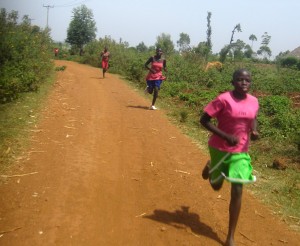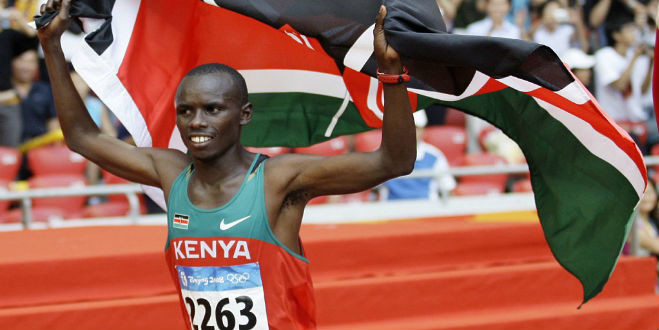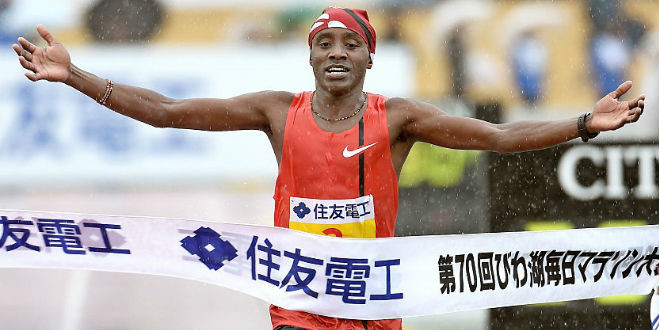Straight From the Horses Mouth:
They are the original long distance running superpower. Everyone wants to know what makes Kenyans so great.
So what do the Kenyans say about their success ? We sat down with John Ngugi and Stephen Ndungu and they told us about it. John Ngugi is one of the greatest distance runner,5000 metres Olympic champion and five times world cross country champion. Ndungu a pace maker and former Mombasa international Marathon champion. John Ngugi outlined what he saw as the myths that people have built around the Kenyans.
All Kenyans are born at high altitude:
Ngugi was not at all sure about this one. The assumption here that he refutes is that everyone in Kenya is born at high altitude. It is not necessarily the case he says: ”How many Kenyans are born at altitude? Most Kenyans don’t know what altitude they were born at. They may be born at high altitude but that is not the main thing.
Workout – hills, track or a long run again. In the evening we do ‘individual running’ it may be two miles, maybe 5 miles or maybe 10k. Television at home means that the training is easier to focus on: In Kenya there is few channels on Television. So after the 7pm news many will go to bed, 8pm to 9pm. They have to get up ready to run at 6am.
You Ain’t Seen Nothing Yet:
That is how the Kenyans believe they have to go where they are. But they believe there is more to come. Ndungu said: ”There are junior championships in Kenya and a lot of training camps for them. The only problem we face is the lack of training facilities and a lack of qualified coaches. People just tell them to run – not a proper training programme. In the first World Junior Championship Kenyan got seven gold medals. We still believe in Kenya that we have more talent there if we have proper training facilities.
”A lot of shoes companies are going to Kenya to give kit, training facilities and training for coaches so that the coaches are trained to look after young athletes. Most of our athletes are from Eldoret, Nyahururu, and Nyeri. Companies are going there because the talent is so close. In the training camps they are given proper ways of training, accommodation and training facilities. We still believe that we could have more athletes from these places but we need more professional coaches.
”Some big Kenyan athletes have played a big role in Kenya as when they have finished running they go home and start a training camp. People have their own training camps. I have Mt.Kenya Talents Development Centre. Am tapping and nurturing young and upcoming talents. It is more difficult to do now if you have not got the proper training facilities or shoes to give them People will go where they can get these facilities. We don’t have enough facilities. We have two tartan tracks in the Nairobi area and a part from that we use mud tracks. We don’t have good gyms. We carry stones and use our body weight. We hope as time goes on we will be pushing to have all these things –By the time we finish building a modern training camp. Despite seeing the problems with what they have Kenyans seem very willing to just knuckles down to the hard work and their view of what is necessary and what is luxury is very different to athletes in the West.
IMAGE
And with the food and drink, after a suitable rest, comes the hard training. Ngugi says: ‘After a busy season a Kenyan will take one month, two months or maybe three months of rest. I used to take two month off in September and October and then start running. When I first started I would go out for 20min in the morning for one week, then 30mins, normally we first know when we are racing and if you are going to be racing in December or January you need to start early. Those who don’t do cross country or indoor need to train starting from November – starting easy, doing more mileage not track work. We do fartlek and when we have two months to go before the championships we start doing the speedworsk. ”We Kenyans believe that if you want to run good and for a long time you don’t need to go to the track and do lots of workout you need to start doing hard work and long distance running before the season starts”.
Kenyan Run to School and Run from an Early Age:
Stephen Ndungu says this is downright untrue. He says: ”some Kenyan runners have schools only a stone’s throw their home.
Genetics:
Ngugi admits this may be a factor to some extent. But he is not convinced: ”this may be part of it but not, I believe, the main factor ”. And his scepticism of this point carries over into what he sees as the next myth.
Body Structure:
Watching Kenyans run seems they are born to run, built to run. Stephen however says he sees people like this all over the place. He says ”I was in Ireland and most people there were tall and thin, they have the same structure.”
And looks he says can be deceptive. Some runners who look as though they have the best body structure and most ungainly running styles ever seen in world athletics. But he won the world cross country title a record five times. The Konchellah`s were world class and extremely good runners they are Masai and have good body structure but it is not the Koncehllah`s who hold world records.”
Publicity:
In countries like Britain running has to compete with football, computer games, mountain biking and any number of other sports. Stephen says: ”this is not true as most people want to be footballers. Athletics is not well publicized. Fewer people recognize John Ngugi than George Weah (a top African footballer. Football is the number one sport in Kenyan.” So what sets the Kenyans apart from the rest of the world?
If you Train Hard You Win Easy:
Can the truth be this simple? Stephen says: ”If you do something hard you get better at it.And like a true tea drinking Kenyan Stephen uses the drink as his analogy for leaving no stone unturned in the search for the best performance: ”To make good tea you need milk, sugar and tea . You have to sweat and work to get the milk, sweat and work to get the sugar and sweat and work to get the tea. If you don’t it taste bad, if you do it taste good. But there are other factors tied up with this.
Diet:
The Kenyan believes natural is better: ”when you are in the UK, USA or other parts of the world, and you want something you get it form the fridge. In Kenya if you want to cook an onion I pick it from the farm. We don’t use from genetically modified food.
Income:
Money is a motivating factor for the Kenyans too. But in a very different way. Stephen Said: ”In Kenya the standard of living is terrible. Employment is the number one problem. If someone runs a race and wins $1000 that is 80,000 Kenyan Shilling. It would take a full year for an officer in Kenya to earn that much. To just wake up and make your legs move and win $1000 is a main factor.”
Harambee:
The Harambee factor is something anyone who has trained or lived with a group of Kenyans will recognize. Stephen explains: ”Harambee means pulling together as a group. The first president spoke of this in 1960 when Kenya gained its independence: one person can do nothing by himself. You need to depend one another- you can’t build a school on your own. Children born in Kenya are brought up in the village. He remains in a group not as an individual. You run as a group and not an individual.
The spirit is in athletics now. Harambee is a national spirit. There is nothing that is achievable than doing it as a group. We have to train with upcoming runners so they can catch up and keep up with you. We train as a group. That has enable us to do very well in the world championships. And it means one coach can look after more than 100 athletes. It is very easy for them to train together as they understand each other fully. The training programmes in Kenya are not from a book. The coach wakes up and makes the programme for that day. If he needs to change the training he will do so.
Home vs Abroad:
Cultural issues do come into Kenya’s success. Stephen says: ‘In the early 80s and early 90s education as an issue began to pick up scholarship presented themselves. People such as Mike Boit, Douglas Wakiihuri, Julius Kariuki, Patrick Sang and Peter Rono did the best education in Kenya and then coaches from colleges in Europe, Japan and the US came to find athletes. From 1992 onward agents tried to get athletes and encouraged them to train in Kenya, race all over the world, and then go back to Kenya. There are many private training camps in Kenya, unlike Mt. Kenya Talents Development Centre which is a free, charitable center for all: upcoming runners, street children, orphans, the poor and more in this same caliber who would benefit from it.
The training in Kenya is very different compared with UK and USA. In Kenya we train three times a day. At 6am we run for an hour, 90 min or maybe 40min. at 10am we do track sessions.
Hits: 370
 Mt. Kenya Talents Development Centre Mt. Kenya Talents Development Centre
Mt. Kenya Talents Development Centre Mt. Kenya Talents Development Centre





